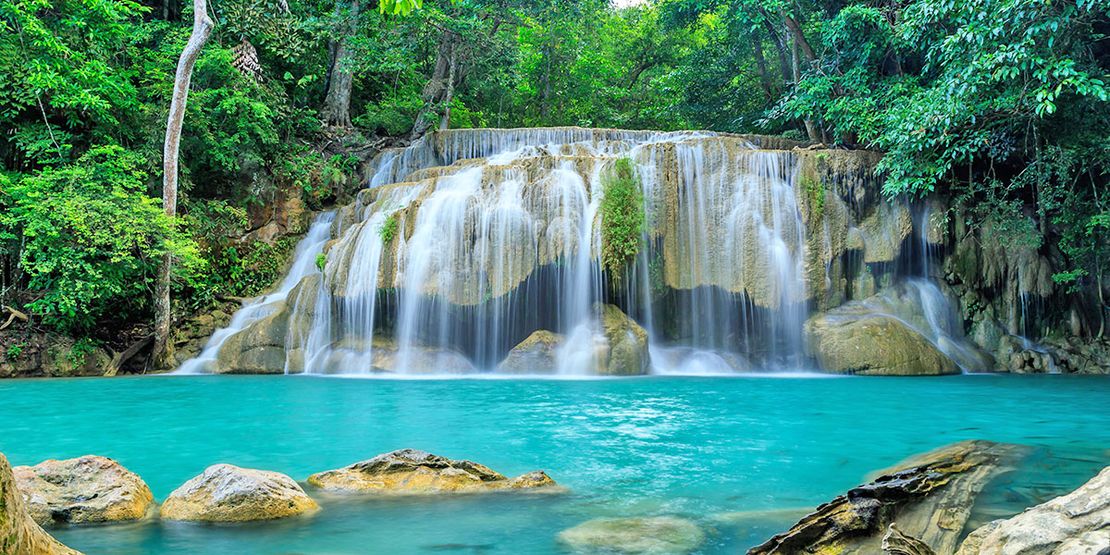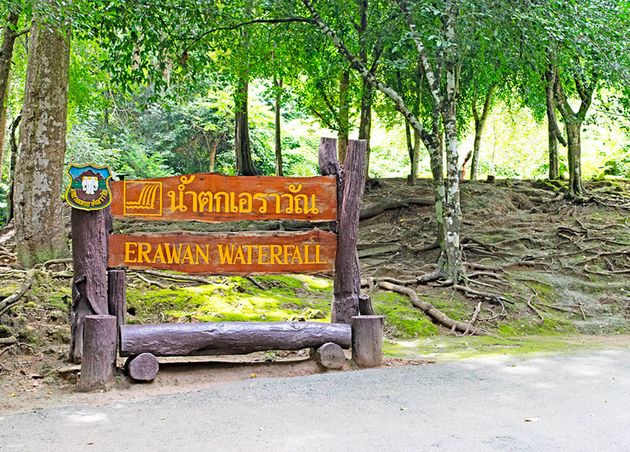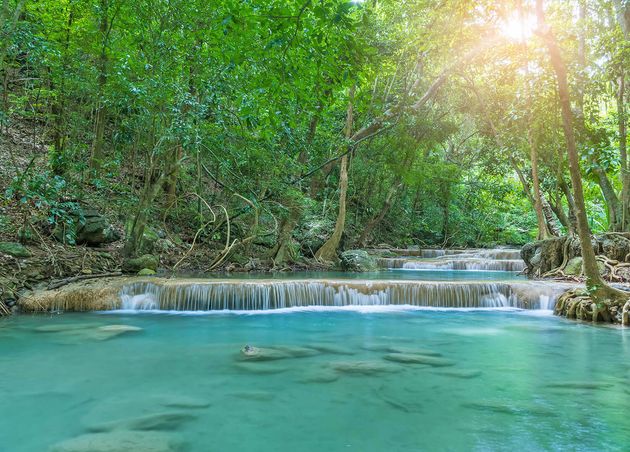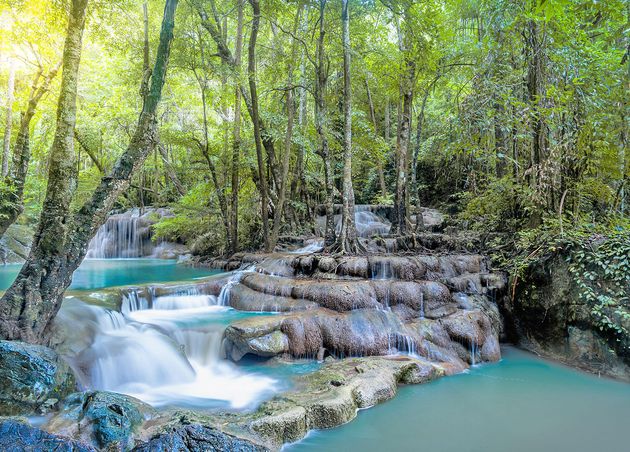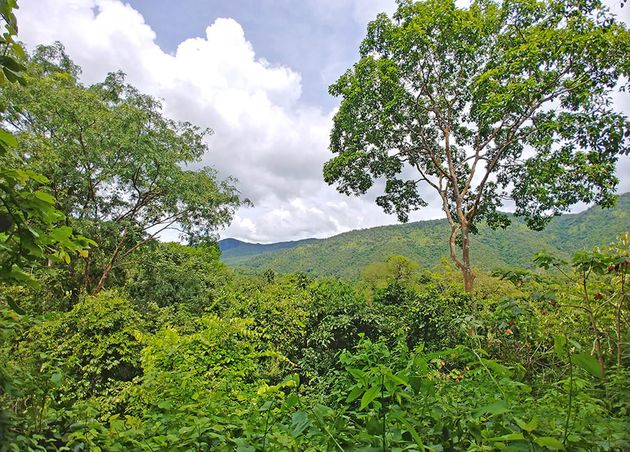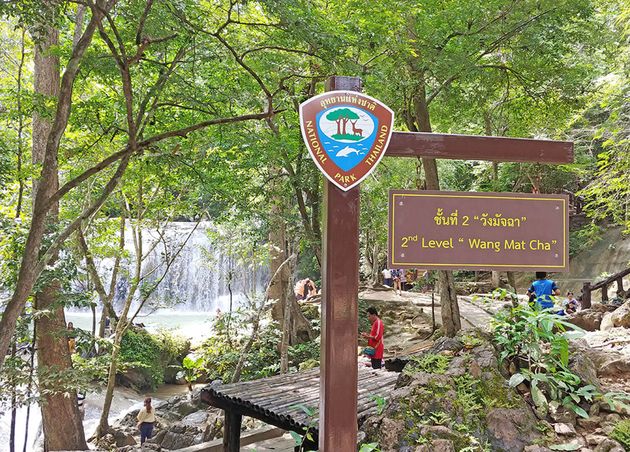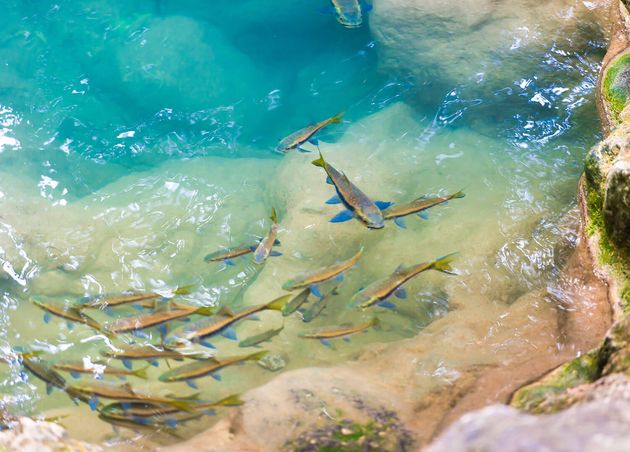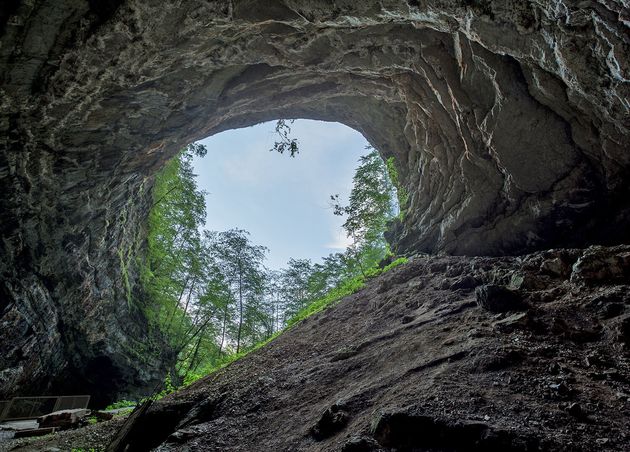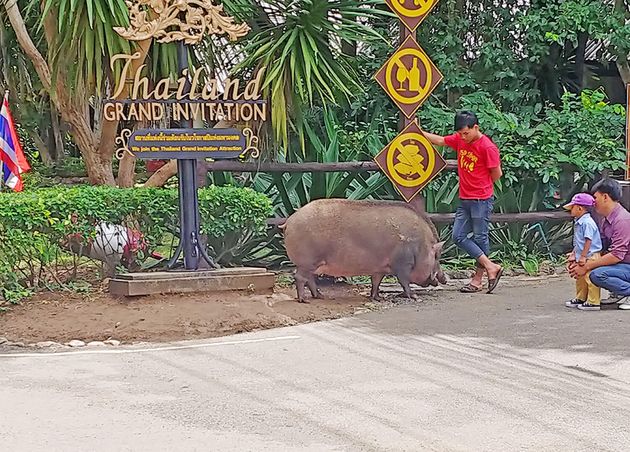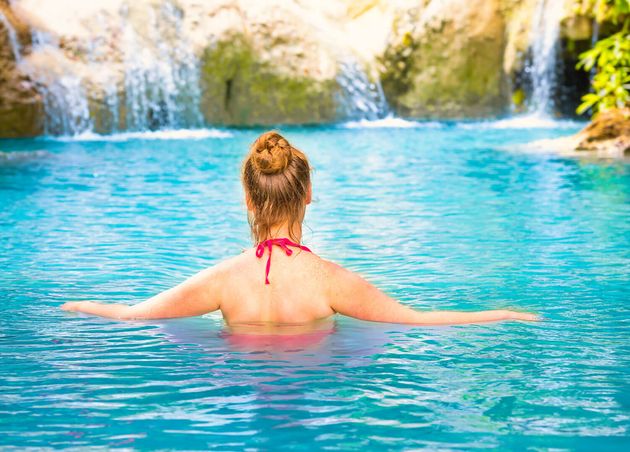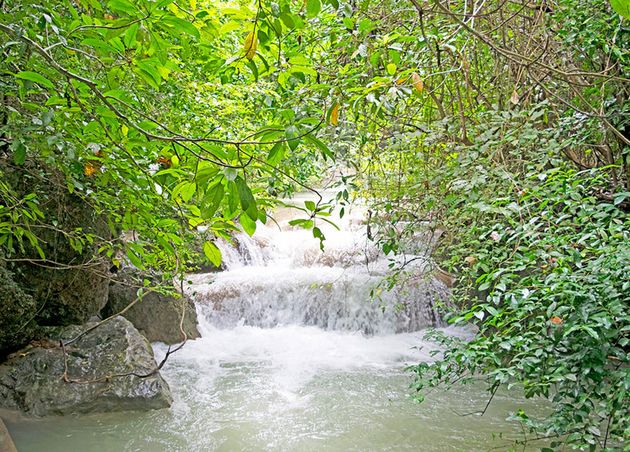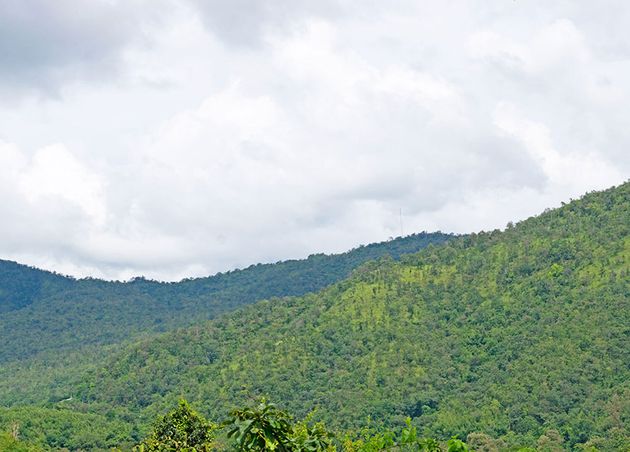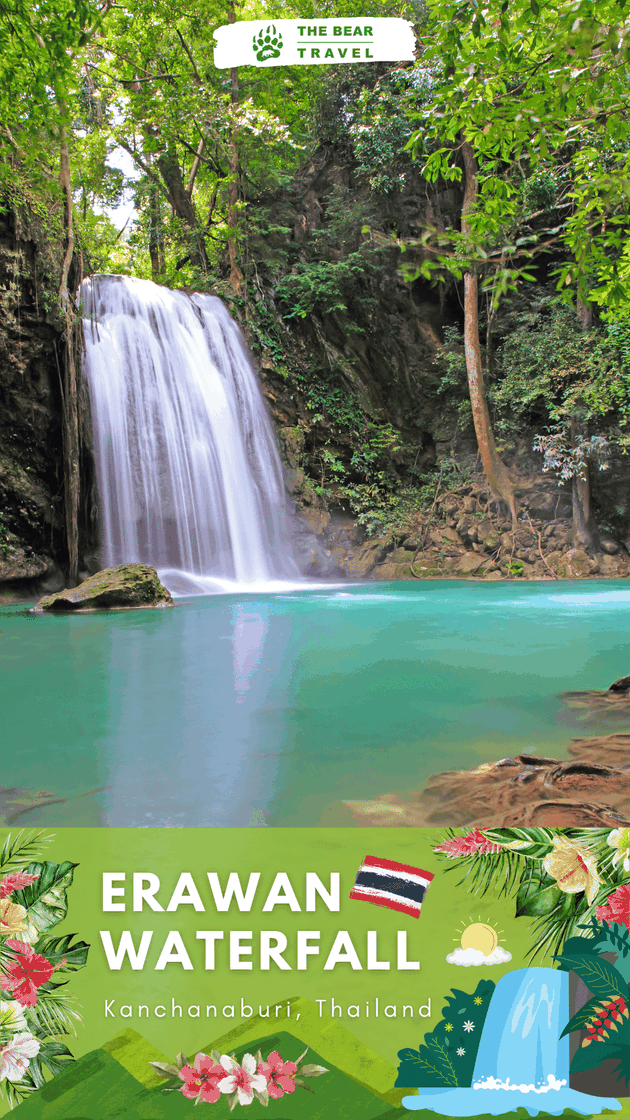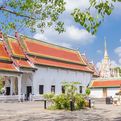Erawan Waterfall: Don't Miss this Trekking Adventure in Kanchanaburi!
Kanchanaburi is a well-known backpacker destination due to its accessibility and history. Still, it is most famous for being close to Erawan National Park, home to the outstanding 7-tiered Erawan Waterfall.
Located deep within the Erawan National Park in Thailand, the famed 7-tiered Erawan Waterfall is a popular tourist attraction for backpackers. The charming elegance of this waterfall attracts many people to pay a visit to this national park. The flare of greenery with the Erawan Falls in the midst molds a mind-blowing topography. Therefore, it is a fabulous place to check your photography mastery and collect utterly fascinating Instagram-worthy snapshots.
A combination of adventurous and calming glamour, the waterfall earns a visit when in Kanchanaburi. So, if you are a nature lover and want to admire the beauty of the Erawan Waterfalls, join us here.
An exciting piece of information about Erawan Waterfall is its name which owes to the three-headed white elephant in Hindu folklore. Why? Because the top layer of Erawan Waterfall is supposed to look like the elephant's head.
Trekking Through the 7 Tiers of Erawan Waterfall
The 1,500 meters of Erawan Waterfall, running through the severe rainforest, signifies some exploration. It has seven tiers, each one possessing its name and characteristics. The path to the Erawan Waterfall is simple yet barely tricky, as each level is higher than the previous one.
The first tier, Hlai Keun Lang, has a comparatively straightforward entry. It is a direct hike from the car parking area. Spectator little fish swim in the ponds set by the water flow. Thereon, washing the legs and having a cheerful time with them, walk to the next tier - Wung Macha. Here, the road gets straighter and puts up with one to the second tier, constantly energetic during summers as people swim their way out from the scorching warmth. Furthermore, a small cave under the waterfall makes it all the more picturesque.
Pha Nam Tok, the third tier, can achieve a 50-meter trek from the second tier. This one is narrowly higher than the previous ones, possessing a height of 20 meters. It has a big pond full of fish. Sit beside the refreshing waters and relax for a bit. Afterward, walk toward the Erawan Waterfall's fourth and fifth tiers. Captioning tiny pores and ponds, the two are enclosed by large rock arrangements.
Several flora varieties can be seen here owing to the national park's large greenery cover. The road reaches more challenging post the fifth tier. It brings a reasonable effort for one to travel to the sixth tier to achieve the final and the tallest level.
The sixth step is a multi-level stream of water, appealing enough to bring one fall into it without giving an impression. Cables and rickety ladders enter the rescue and assist in finishing the entire trek to the seventh tier, inferred as Phu Phu Erawan. This ultimate tier, which approximates the structure of a three-headed elephant from Hindu mythology, Erawan, looks terrific.
Waterfalls are cold, so if you foresee a comfortable dive, think again!
The Natural Beauty of Erawan Waterfall
The Erawan Waterfall cascades down the viewpoint of an abruptly stepped hill, giving growth to the natural sensation of the pertained waterfall. Each of the seven waterfalls descends into expansive pools colored bright blue or emerald green due to the underlying chalkstone. If the Erawan Waterfall can be undergone before the entrance of the tourists, trainers, and overseen journeys, it can be an enchanting and mysterious site.
Each of the seven waterfalls of Erawan is extraordinary, with the often streaming water carving out several channels to flow down the hillside. The river which sets the Erawan Waterfall is a tributary to the Mae Nam Khwae Yai River. Life is working together in the deeper pools, the natural environment of the fish that nibbles the dead skin of the feet.
Some of the Erawan pools are deep enough for bathing and swimming, and if part of an ordered tour, remember to get a swimming outfit and towels. A widespread workout of the Erawan Waterfalls is to glide the semi-permanent path to the top and the giant waterfall pool. This climb assumes roughly 20 to 30 minutes, depending on the number of travelers and the level of the extreme humidity, and is nearly 2 km from the main entrance.
What are Some Ways to Maximize Your Experience?
If you’ve decided that visiting Erawan Waterfall must be definitely on your Thailand bucket list, then here’s what you want to know:
Avoid Day Tripping
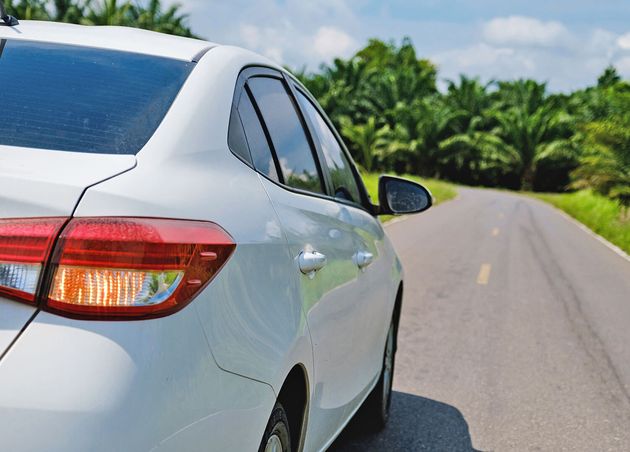 Avoid the one-day trip from Krung Thep Maha Nakhon (Bangkok). There's hardly enough time to explore the falls, and you may go during the busiest hours when many other tourist buses arrive.
Avoid the one-day trip from Krung Thep Maha Nakhon (Bangkok). There's hardly enough time to explore the falls, and you may go during the busiest hours when many other tourist buses arrive.
Select the Best Season
Although Erawan National Park is open throughout the year, the best time to travel to Thailand and visit the falls is from September to December, just after the rainy season and before the dry season rushes in.
Stop Weekends and Peak Times
The weekends attract many local weekenders, backpackers, and day-trippers from Krung Thep Maha Nakhon (Bangkok), resulting in huge crowds. To avoid this, it is recommended to travel during the weekdays.
Avoid Peak Hours
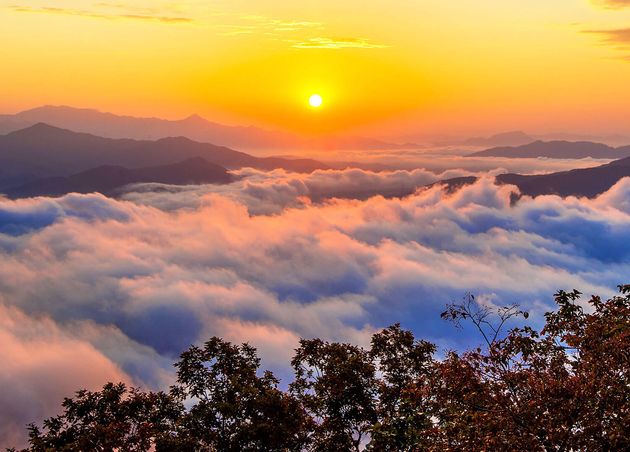 The adequate time to visit is the early morning before the tour buses leave Krung Thep Maha Nakhon (Bangkok).
The adequate time to visit is the early morning before the tour buses leave Krung Thep Maha Nakhon (Bangkok).
Top Things to Do at Erawan Waterfall
Exploring the Caves
The Erawan National Park is home to some historical caves that might fall on the way to the waterfall. The four caves worth visiting are Mi Cave, Phartat Cave, Reua Cave, and Ta Duang Cave.
Wildlife Spotting
As the waterfall is creased inside a dense forest, the opportunities of placing some wilderness are elevated. Be ready with a camera while stepping on the trails.
Swimming in the Waterfalls
You can swim in the waterfalls, but you’ll desire to wear a life vest, which you can rent inside the park between the first and second waterfalls.
Why Visit Erawan Waterfall in Kanchanaburi?
Erawan National Park is prominent for the Erawan Waterfall. This is, by no doubt, one of the most beautiful waterfalls that you have ever seen. The falls are deep inside the forests, which gives them an air of mystery. In addition, these are a lot more than just a single-drop surprise. There are seven drops and hundreds of rapids in the waterfall. You can even see fish on the clear riverbed.
Separated from the waterfall, it is a beautiful place to get a kick out of a couple of days in the forests. One can stay in the woods with tents and take camping goods. If you like more enjoyment, you can furthermore get a bungalow. But it sure is far from civilization, deep inside the jungles. And a classic way of urban detoxification.
In addition, the 7-tier waterfalls are considered the best natural event in the region. They are highly approved to visit while in Kanchanaburi.
How to Visit Erawan Waterfall in Kanchanaburi?
- By Train:
Thonburi Train Station is the nearest railway station to Erawan Waterfall in Krung Thep Maha Nakhon (Bangkok). From here, hire a private taxi directly to the Erawan National Park, where the waterfall is located. - By Bus:
The buses run regularly from Kanchanaburi Bus Station to Erawan Waterfall. A single trip to the falls amounts to THB 50. Buses from this station begin their processes at 8:00 in the morning. The last bus from the waterfall to Kanchanaburi is at 5:00 PM.
If arriving from Krung Thep Maha Nakhon (Bangkok), first enter Bangkok's Southern Bus Terminal. From here, BKS Public Buses, line 81, exit for Kanchanaburi every 15-20 minutes. To reach the waterfall, one can hire a taxi or take a local bus, which takes approximately two hours to get to Kanchanaburi. - By Car:
Renting a private car to ride along the coasts of Thailand is an incredible idea. One can similarly hire a private taxi from Krung Thep Maha Nakhon (Bangkok) to Erawan Waterfall.
The Erawan Waterfall is a distinguished place among locals and tourists. Hence, it is highly crowded on weekends. It is eligible to visit early in the morning on weekdays.
Map & More Information
Erawan Waterfall is the most stunning natural arrangement in Kanchanaburi, within the Erawan National Park. The river cascades down the side of a hill, forming a set of seven waterfalls flanked by deep blue plunge pools. These pools are the natural housing of dead skin-eating fish. Tour guides interpret the waterfalls of Erawan as a fabulous natural event in Thailand, and they could well be.
|
Fees |
Adult: 400 Thai Baht | Children: 200 Thai Baht |
|
Business Address |
Tha Kradan, Si Sawat District, Kanchanaburi 71250 |
|
Business Hours |
08:00 - 17:00 | Monday - Sunday |
|
Website |
|
|
GPS |
14.3686275, 99.1439422 |
The Bear Team
We, The Bear Team, are a united group of digital experts and adventurers. Combining technical skills with creative flair, we deliver informative, valuable, up-to-date content. Whether seeking travel inspiration or innovative solutions, we're your go-to for fun, authentic, impactful, and timeless experiences.
The Bear Travel | Experience like a Local
A fast-growing Thailand Travel Blog written by Expats and Thais since 2017. We will share our experiences and ideas from an insider point of view for you to create your own unique Thailand experience.
For the latest news and events about The Bear Travel, follow us on Facebook, Instagram, Twitter, Pinterest, or YouTube.
For any issues, concerns, or queries, don’t hesitate to CONTACT us.
Recommended for you
Top 10 Best Gay Dating Apps You'll Surely Love While in Thailand
Gabriel (Gay Bear)
Maximizing Profitability: The Ultimate Smart IoT Controller for Shrimp Farmers
Riley Sinclair (Digital Aqua Bear)
Top 10 Most Popular Seafood and Italian Restaurants in Pattaya
Tle (Hungry Bear)


